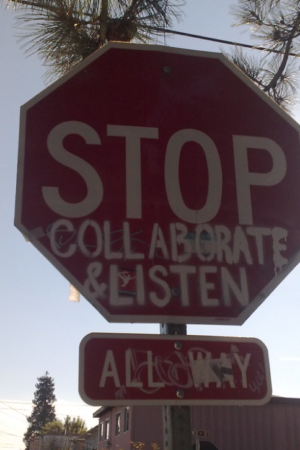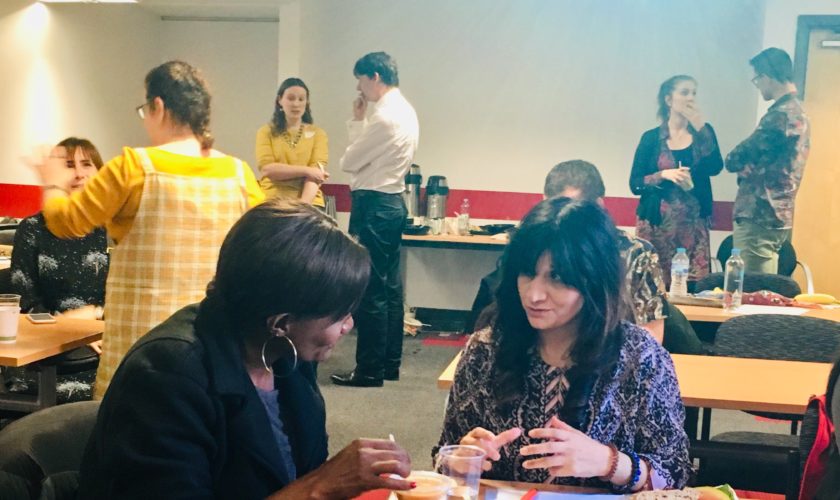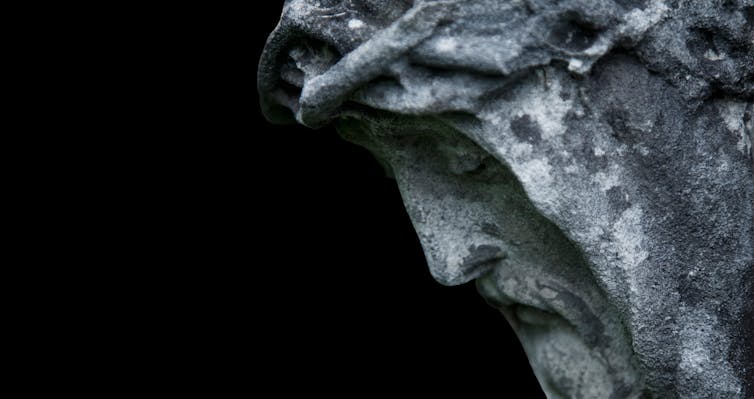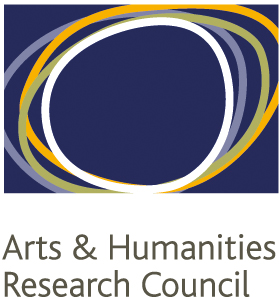Mmapula Kebaneilwe (University of Botswana) is a womanist biblical scholar and project partner for an Arts and Humanities Research Council (AHRC) grant entitled ‘Resisting Gender-Based Violence and Injustice ThroughActivism with Bible Texts and Images’.
Her recent research visit brought her to Yorkshire, where both the project’s principal investigator (Johanna Stiebert, University of Leeds) and co-investigator (Katie Edwards, University of Sheffield) are based. All three, together with co-lead of the Shiloh Project Caroline Blyth (University of Auckland), who is spending part of her sabbatical at the University of Leeds, organized a research day at the University of Leeds.
The aim of the day was to bring together a diverse group of researchers and practitioners who all engage with some aspect of confronting, understanding and reducing the prevalence of gender-based and/or sexual violence. All share experience of working on or with victims and survivors of gender-based violence; all share a commitment to and drive for facilitating information, practical help or healing; all are open to opportunities for effective collaboration and networking between academic and public sectors.
The Shiloh Project is a collaboration of scholars and activists and was launched in early 2017. It seeks to explore and promote ways for better understanding the dynamics and intersections between religion, the Bible, gender-based violence and rape culture. This is in acknowledgement that matters of religion and faith have diverse and profound impact on human interactions the world over – including when it comes to domestic, sexual and gender-based violence. Such impact was amply borne out by all participants in the research day on 25 March 2019, which was attended by 20 active participants. The research day was co-sponsored by the AHRC and the Centre for Religion and Public Life. It represents one of several Shiloh Project initiatives.
Here is a quick summary of participants and organizations. Each participant, or participant pair, gave a summary and introduction to their work and expertise.
Angela Connor and Esther Nield represented the Sexual Assault Referral Centre (SARC) team of the Hazlehurst Centre in West Yorkshire. Angela is the Hazlehurst Centre manager and Esther works in the Centre as a crisis worker. SARC provides acute service (for up to seven days post incident). The SARC is commissioned by the National Health Service (NHS) and Police to provide forensic healthcare, alongside free support and practical help to anyone in West Yorkshire who has experienced sexual violence or abuse. The majority of victims (around 80%) are referred by the Police. The majority are white women under the age of forty but the service is available to anyone, for no charge, irrespective of age, ethnicity, gender, gender identity, sexual orientation, religious affiliation, or immigration status. The Centre strives to become more accessible to diverse demographics and nurses take pride in providing sensitive expert care.
Misbah Ali (Legal Assistance and Senior Development Worker) and Michelle O’Neill (Senior Capacity Builder and Recovery Worker) together represented Staying Put, a charity providing gender-sensitive services for men and women in the wider Bradford area of Yorkshire who experience abuse from a family member or intimate partner in a domestic setting. The charity attends to about 1200 to 1400 users per year. They work with situations in the area of domestic violence, intimate partner violence and forced marriage and assist in reducing victimization, preventing domestic homicide and facilitating domestic safety and security. The organization fulfills diverse services – including providing information about female genital mutilation (FGM), conducting family interventions, issuing legal advice, evidence gathering, support for attending court, as well as practical and emotional support. Their Freedom Programme operates in several languages (Urdu, English and Polish). Misbah and Michelle reported on the relative frequency of ‘spiritual abuse’ – that is, abuse attributed to possession, witchcraft and djinns, for instance. The told the group that they come across such matters more and more often but do not always feel adequately trained to address some religious justifications of violence.
Ziona Handler is the Manchester keyworker for Jewish Women’s Aid (JWA), working for and with victims of abuse in Jewish communities across all of the North of England. JWA is a registered charity and Ziona is emphatic that Jewish communities are as affected as other communities when it comes to the spectrum of domestic violence, which encompasses physical, sexual, psychological, economic, spiritual and cultural abuse. In terms of recognizing and addressing such abuse and supporting victims, many of the strategies detailed by representatives of Staying Put resonated with Ziona. But she also pointed out that some matters are bespoke to Jewish communities and best supported by a Jewish practitioner. (The SARC representatives mentioned that they had never, knowingly, assisted a Jewish victim of sexual assault, in spite of West Yorkshire having a sizable Jewish community. This might indicate that Jewish women have preference for groups such as JWA.) Ziona reported that the average period of suffering prior to reporting is a shocking 11.5 years in Jewish communities. JWA offers a variety of core services – including a helpline, client support, counseling, therapy, the Dina Project (a response to #MeToo), children’s therapy and an educational outreach programme that visits schools, synagogues and universities. JWA has launched a Safer Dating campaign in universities and training to address Lad Culture. The charity also has a toilet door campaign (placing stickers bearing information about accessing help from JWA on toilet doors) and provides input and training for non-Jewish groups working with victims of domestic and sexual abuse.
Rabbi Dr Deborah Kahn-Harris is a former congregational rabbi and university chaplain and is now Principal of Leo Baeck College, a rabbinical seminary and centre for training of teachers in Jewish education. Leo Baeck College represents primarily members of Reform Judaism and Liberal Judaism and the institution also trains and ordains women and members of the Jewish LGBT+community. Deborah facilitates training from JWA and stresses that even in progressive communities – where the expectation might be that topics such as ‘consent’ are widely discussed and understood – such training remains essential. Deborah pointed out that low-level microagressions persist – often very publicly – and that biblical and rabbinic texts, which continue to be plumbed and interpreted, have the potential to propel abusive ideas and actions. In a tradition with ancient roots, where ancient texts continue to be given authority, the possibility of internalizing damaging attitudes is considerable. But, as Deborah pointed out, Jewish tradition also offers tremendous scope for critical thinking, debate and resistance. In response to a question from Angela Connor about Jewish attitudes to emergency contraception, Deborah was able to demonstrate this versatility, with recourse to a range of Jewish texts reflecting multiple viewpoints.
Sam Ross is a WRoCAH (White Rose College of the Arts & Humanities) funded PhD candidate in the School of Philosophy, Religion and History of Science (University of Leeds). His provisional thesis title is ‘Queering the Ketuvim: Queer Readings of Representations of Pain and Trauma in Biblical Hebrew Poetry’. Sam has particular interest in trauma research – not least, because the LGBTQ community is particularly vulnerable to discrimination, abuse and prejudice. Sam is using the Bible both because of its persistent influence in faith and secular contexts and because it offers stories that address pain and trauma head-on. His plan is to fuse biblical criticism and autoethnography to explore queer individual suffering (through the book of Job), and queer communal suffering (through the book of Lamentations). Sam also highlighted the particular vulnerability of the trans community and the abusiveness of the so-called ‘trans debate’ in targeting trans persons as aggressors and predators when they are, in actuality, far more often victims of violence, including sexual violence. Representatives from Staying Put confirmed Sam’s point by stating that even professionals are sometimes abusive towards trans persons, citing instances where trans women have been denied access to women’s refuges, with no offer of any alternative help, even when they were at acute risk.
David Smith is Victims Services Commissioning and Third Sector Adviser at the West Yorkshire’s Office of the Police and Crime Commissioner. David has worked in third sector and local government for several decades and has expertise in the area of strategy, planning and policy development. That is, he has expertise in making actions effective. David’s role is to commission support services around domestic abuse and sexual violence. These are usually funded at (increasingly cash-strapped) local and regional levels. David’s work is focused on policy and he has an informed interest also in the language of his subject – such as the language of the victim’s code and witness charter. He agrees that the terminology around sexual violence – of ‘victims’, ‘perpetrators’ and ‘complainants’ –is problematic. He is supportive of the position statement being more inclusive now in its language of violence against men. Male victims, he stresses, are a significant part of the agenda – something which should not take away from the very serious issues facing women and girls. David’s policy-focused perspective was a fascinating one.
Adriaan van Klinken (University of Leeds) is Director of the Centre for Religion and Public Life and an academic working in the areas of religion and public life, gender and sexuality, especially in contemporary Christian contexts of countries in southern and eastern Africa (predominantly, Zambia and Kenya). He is about to embark on a project working closely and collaboratively with Ugandan LGBT refugees in Kenya through using story telling and life stories as a tool for creative and liberating self-expression as well as a research strategy. As Adriaan points out, violence is central in the lives of LGBT people, as well as in the lives of refugees. This violence, moreover, is multi-dimensional and can include religious violence, political violence and police violence.
Sarah-Jane Page (Aston University) is a sociologist of religion. She researches, among other topics, attitudes and practices around sexuality and how these are negotiated in relation to religious tradition. She spoke about two current projects. The first – in the very early stages – examines the Church of England inquiry into child sex abuse. She is focused especially on how organizational and institutional structures serve to enable abuse, as well as in the hierarchies and class dimensions at work in this. Her second project is ethnographic and partly funded by the British Academy. This project looks at varieties of activism, ranging from silent prayer to displays of graphic imagery, outside of abortion clinics. She is especially interested in the reactions and responses to these forms of activism, both from religious and secular sources.
Gordon Lynch (University of Kent) has conducted long-term research and public engagement activities on the history of UK child migration programmes. These programmes, responsible for sending some 100,000 children to Canada, Australia, New Zealand and Zimbabwe, resulted in extensive and sustained abuse, which only came to light much later. He has also served as expert witness under instruction to the Independent Inquiry into Child Sexual Abuse. Gordon’s work has served to raisepublic awareness about historic abuse. He has, for instance,contributed to and organized museum exhibitions, musical performances, and TrueTube films, alongside his many academic publications. Gordon highlighted the dysfunctional relationships between government offices and organizations, including the competing interests, fragmentations and difficulties in terms of challenging groups involved in the networks facilitating migration at the various stages. All of these enabled the abuse to go on for very many years. Moreover, regarding organizations overseen by the Catholic Church, monitoring was minimal,due to assumed ‘bonds of trust’. Gordon asked what it is about religious organizations that exempted them from scrutiny. What permitted the religious exceptionalism that saw the suspension of so many otherwise widely adopted recommendations? When the usual recommendation was to advise that children be adopted, fostered, or raised in small-scale residential units, why were exceptions made by national policy makers to permit religious institutions to run large, understaffed orphanages where abuse was able to thrive?
Sema Khan represented Barnardo’s, a long-established charity that protects and supports above all vulnerable children and young people, as well as parents and carers. She is based in Bradford where Barnardo’s has a family support and a child sexual exploitation (CSE) team. Semareports that more children on the autistic spectrum and more boys and young men are seeking help to address emotional needs, including the help of recovery groups following sexual exploitation. Sema explained, too, that Barnardo’s is less pronouncedly Christian in focus than it has been historically. It has a diverse staff and works for a diverse community, including many Syrian refugees and asylum seekers.
Saima Afzal has worked in all of research, consultancy, local government and community development, particularly in matters to do with religion, gender and South Asian communities of Lancashire and Yorkshire. She is an elected councillor for Blackburn. Saima has conducted research on child sexual exploitation in South Asian communities of the UK, on sexuality in Islam, and on police stop and search powers against minority ethnic communities. Saima has founded her own community interest group called SASRIGHTS CIC (see also Saima Afzal Solutions). She works as a freelance criminologist and has served as expert witness for cases involving domestic abuse, forced marriage and so-called “honour”-based killing. She has received an MBE for her services to policing and community relations.
Bob Balfour is founder of Survivors West Yorkshire(SWY), formerly called One In Four (North). SWY is action-oriented and works in supporting survivors of sexual abuse. Prominently included in this support are male survivors of sexual abuse. Bob was also instrumental in the creation of Ben’s Place, a West Yorkshire support service for male survivors of sexual abuse, named after Ben, a survivor of childhood sexual abuse who took his own life soon after his twenty-third birthday. The mission of Ben’s Place is to deliver specialist support and advice to adult male survivors (i.e. aged 16+) who are ready to disclose experiences of sexual crimes committed against them and who want to access support to explore options for understanding and integrating what was done to them. SWY and Ben’s Place work in partnership with Rape Crisis and challenge the silencing and alienation of survivors. One of Bob’s campaigns is ‘Challenge the Silence’ and he has written for ‘A View From Inside the Box’. Bob has been vigorous in his resistance to denial. He has not only founded support groups and actions, he has published on the topic, devised practical strategies for post-traumatic growth, collaborated with universities as ‘expert by experience’ and in the role of Teacher at Liverpool (paid for by the NHS), and is currently supervising four Clinical Psychology students.
Jo Sadgrove has considerable expertise in the area of faith-based international development – both as an academic researcher and a practitioner. She works part-time as research and learning advisor to the United Society Partners in the Gospel (USPG), an Anglican mission agency engaging in community development and theological education around the world. Jo discussed the imperialist echoes and tendencies of some of the work of USPG but also the ways that being part of such an organization can give access to networks and opportunities for making a difference. Jo’s particular interests are in intersections of religion and health and in Christianity and sexuality in cross-cultural perspectives. Jo talked about workshops she has conducted with perpetrators of gender-based violence, which bring men together to talk about being men and about violence in their lives. She sees great value in working with perpetrators as well as victims of gender-based violence.
Jo has direct experience of We Will Speak Out, a global coalition of churches and Christian NGO’s challenging prevailing patterns of violence.
After presentations from all participants, we had an open discussion to begin to explore ways of collaboration and support. During the coffee and lunch breaks already, representatives from different institutions and organizations had begun to chat in small groups and exchange information, advice, and ask questions.
The following arose in discussion:
There is little available in the way of accessible, succinct and helpful information on the topic of spiritual abuse. More discussion and more research on the topic are required. This would be invaluable for a range of practitioners encountering perpetrators and victims of gender-based violence. (Representatives of Staying Put reported that a defense of spiritual abuse – blaming demons, possession, djinns, or witchcraft for inciting violence, including sexual abuse – comes out with some regularity in one-on-one conversations with both perpetrators and victims.)
More emphasis on prevention is necessary. Often crisis support is the preserve of highly trained effective individuals. But more expertise needs to be invested in recognizing the signs before the tipping point.
Not infrequently – and this is sometimes due to the sheer strain on service providers (something that received repeated mention) – professionals become part of the problem for already vulnerable groups. Sometimes, for instance, there will be insistence (by social welfare or by NGO or charity staff) that service users take a particular training course, with the threat that otherwise their children will be removed. The effect of this can be to alienate already vulnerable people and to deter them from continuing to seek professional help.
Practitioners welcomed the opportunity to meet others working in related areas. They would very much like more work between groups. SARC, for instance, would appreciate information about JWA, to make bespoke help available in their networks targeting vulnerable people in the community at risk of sexual violence.
There was acknowledgement that communities are diverse and that multi-faceted expertise is needed (e.g. from all of police, social services, consultants, charities, etc.) to address gender-based and sexual violence. Again, better communication between different groups is recognized as important.
There was an expression of need for more religious and cultural literacy – and for academics who could providethis in accessible ways.
Practical micro-level and macro-level strategies are required to address the structural problems that facilitate much of the violence on the ground.
David Smith mentioned that he is often looking for research pieces towards capacity building. He recommends that we all register with and join Blue Light Services, to let emergency services know what we can provide.
There was widespread acknowledgement that religious leaders are often obstructive when it comes to addressing domestic situations of violence and abuse. More needs to be done to train religious leaders in gender-sensitive strategies, as well as in encouraging them to facilitate professional advice for their community members – as opposed to attempting to handle delicate and complex matters themselves when they lack the necessary training and expertise.
The Sex and Relationships Education curriculum, to be rolled out September 2020, is likely to lead to a deluge of referrals. Help will be needed urgently to manage these.
Some practitioners predict a backlash to the extent of safeguarding training – a backlash that will include alsotheological and ethical questions. Again, collaboration between practitioners and researchers will be important in addressing these.
All in all, it was a stimulating, thought-provoking and fruitful day. We will take the conversations forward in our ongoing work in Project Shiloh. This was just the start of the conversation, and we hope to sustain it through ongoing collaborations.














 Crucifixion was a form of state terror and victims were likely to be stripped.
Crucifixion was a form of state terror and victims were likely to be stripped.


